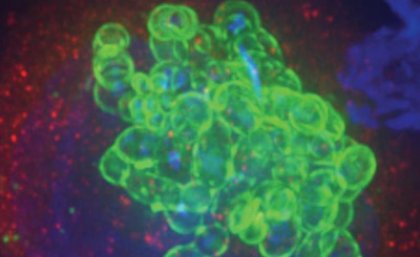
Scientists from The University of Queensland have discovered that a microbe responsible for invasive bacterial Group A Streptococcus infections can bypass the immune system and multiply within infected cells.
Group A Streptococcus is one of the world’s most fatal infectious diseases, with 600,000 cases annually.
In December last year a statewide alert was issued to all doctors and hospitals after a four-year-old child died from Group A Streptococcal disease in Brisbane.
Research leader Dr Tim Barnett from UQ’s School of Chemistry and Molecular Biosciences said the findings were significant because they contradicted previous understandings of how the bacteria behaved.
“We studied M1T1, one of the most prevalent strains affecting the developed world,” Dr Barnett said.
“It had previously been thought that autophagy, which is part of the immune response, efficiently defended the interior of cells against Group A Streptococcus.”
He said the research showed that in fact M1T1 produced an enzyme that breaks down the patient’s immune proteins that fight bacterial infection.
“Our findings were vastly different to previous studies that used strains not commonly associated with human disease,” Dr Barnett said.
“We now know that Streptococcus can hide, survive and grow in cells.”
Dr Barnett is part of Professor Mark Walker’s research group.
He and other colleagues at the Australian Infectious Diseases Research Centre are using this discovery to continue investigations in the field.
The research is also relevant to a number of types of Group A Streptococcus, including M12 strain found in a recent outbreak of scarlet fever in Hong Kong.
Cell Host & Microbe has published the research here.
Media: Dr Tim Barnett, UQ School of Chemistry and Molecular Biosciences, 0450 061 973 or t.barnett1@uq.edu.au
.jpg)










